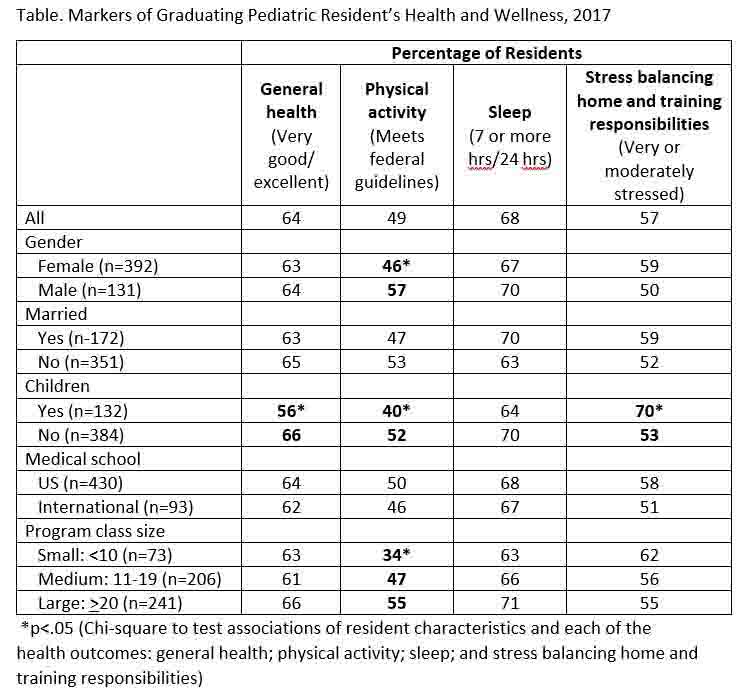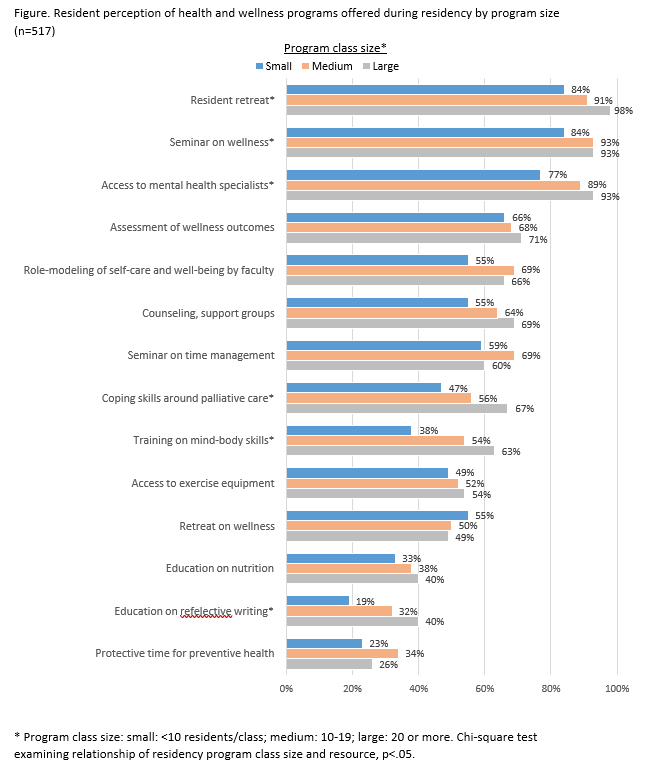Mary Pat Frintner, MSPH;1 Chloe Somberg, BA;1 Sheneka Horne, MD;2 Hilary H. McClafferty, MD;3 Bobbi J. Byrne, MD4
1American Academy of Pediatrics, Itasca, IL; 2St Joseph's Regional Medical Center, Paterson, NJ; 3The University of Arizona Health Sciences, Tucson, AZ; 4Indiana University School of Medicine, Indianapolis, IN
Presented at the 2018 Pediatric Academic Societies Annual Meeting.
Background: Physician well-being has gained national attention due to increasing reports of burnout. Little is known nationally about markers of wellness in residents or program efforts to promote resident wellbeing.
Objectives: Assess whether 1) indicators of graduating residents’ health and wellness vary by resident characteristics and 2) programs are offered to enhance resident well-being and vary by program size.
Methods: AAP Annual Survey of Graduating Residents was administered to a random sample of 1,000 US residents graduating in 2017; 528 (53%) responded. Chi-square identified associations of resident characteristics and 1) General health, 2) Physical activity: national guidelines = 150 min/wk moderate- intensity, 75 min/wk vigorous-intensity, or equivalent of both activities, 3) Sleep: ≥ 7 hours during a 24 hr period, and 4) Stress balancing training and home responsibilities. Chi-square also examined whether wellness programs offered during residency vary by program class size.
Results: Six in 10 respondents reported very good/excellent health, 49% met/exceeded activity guidelines, 68% slept 7 or more hours and 57% were moderately/very stressed balancing their training and home responsibilities. Residents with children were less likely to report very good/excellent health and meeting activity guidelines and more likely to report being stressed balancing their responsibilities, p<.05 [Table]. Residents in larger programs were more likely to report meeting activity guidelines.
Most residents reported their residency programs offered resident retreats (93%), seminars on wellness (92%), and access to mental health specialists (89%). Fewer reported protective time for preventive health (29%) and education on reflective writing (34%) or nutrition (38%). Residents from larger programs were more likely than those from smaller programs to report resident retreats, seminars on wellness, access to mental health specialists, coping skills around palliative care, training on mind-body skills, and education on reflective writing, p<.05 [Figure].
Conclusions: Half of graduating pediatric residents are getting recommended physical activity and over half are stressed balancing their responsibilities, particularly those from larger programs. Programs are offering residents resources related to their health and wellness. Future work might address whether such efforts enhance wellness and target residents’ priorities, especially those with children.


Last Updated
10/15/2021
Source
American Academy of Pediatrics